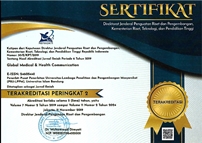The Effect of Mixed-Fruit Juice on Uterine Contractions and Cervical Dilatation During the First Stage of Delivery
Abstract
Energy imbalance in delivery can inhibit the action of glycolytic enzymes and interfere with chemical reactions in muscle cells. These nuisances may interfere with uterine contractions that obstruct cervical dilatation. Therefore, mothers require a nutritional alternative which is practical, generates energy quickly and supplies glucose needed for uterine contractions. These can be fulfilled with a mixed-fruit juice beverage. Mixed-fruit juice consists of fruits, Tunisian dates, honey, and red beans. This study aims to analyze the effect of the mixed-fruit extract on uterine contraction and cervical dilatation during the first stage of delivery. This study used a randomized controlled trial design. The target population was all the mothers who would give birth in Bandung city in March−April 2017. The samples of this study were the gravida <4 who would give birth at the Pelayanan Obstetri Neonatal Emergensi Dasar/PONED (Basic Emergency Obstetric and Neonatal Care/BEONC) Puskesmas (Public Health Center) Ibrahim Ajie, Puter, Garuda, Pagarsih, and Padasuka, consisting of 30 subjects as the treatment group and other 30 subjects as the control group. Uterine contractions and cervical dilatation were measured clinically and recorded on partograph. The analysis of data was done using the chi-square test, independent t test, and Mann-Whitney test. The results showed that there was the effect of mix-juice on the frequency, the duration and the intensity of uterine contractions and cervical dilatation with p value<0.05 and relative risk (RR) values respectively of 1.3, 3.3, 2.6, 1.7. In conclusion, consuming mixed-fruit juice during the first stage of delivery give a significant impact on the progress of uterine contractions and cervical dilatation.
PENGARUH PEMBERIAN MINUMAN MIX JUICE TERHADAP KONTRAKSI UTERUS DAN PEMBUKAAN SERVIKS SELAMA KALA I PERSALINAN
Ketidakseimbangan energi saat persalinan dapat menghambat kerja enzim glikolitik dan mengganggu reaksi kimia dalam sel otot sehingga dapat menghambat kontraksi otot dan pembukaan serviks. Perlu alternatif nutrisi ibu bersalin yang praktis, cepat menghasilkan energi, dan memberikan asupan glukosa yang dibutuhkan untuk kontraksi uterus dalam bentuk minuman mix juice. Mix juice ini mengandung buah-buahan, kurma tunisia, madu, dan kacang merah. Penelitian ini bertujuan menganalisis pengaruh pemberian minuman mix juice terhadap kontraksi uterus dan pembukaan serviks selama kala I persalinan. Penelitian ini menggunakan desain randomized controlled trial. Populasi target adalah semua ibu yang akan melahirkan di Kota Bandung pada bulan Maret−April 2017. Sampel dalam penelitian ini adalah gravida <4 yang akan melahirkan di Puskesmas Pelayanan Obstetri Neonatus Emergensi Dasar (PONED) Ibrahim Ajie, Puter, Garuda, Pagarsih, dan Padasuka, yaitu 30 subjek pada kelompok perlakuan dan 30 subjek pada kelompok kontrol. Kontraksi uterus dan pembukaan serviks diukur secara klinis dan dicatat pada partograf. Analisis data menggunakan uji chi-kuadrat, uji t independen, dan Uji Mann-Whitney. Hasil penelitian didapatkan pengaruh pemberian minuman mix juice terhadap frekuensi, lama dan intensitas kontraksi uterus, serta pembukaan serviks dengan nilai p<0,05 dan nilai RR masing-masing sebesar 1,3; 3,3; 2,6; 1,7. Simpulan, pemberian minuman mix juice selama kala I persalinan berpengaruh terhadap kemajuan kontraksi uterus dan pembukaan serviks.
Keywords
Full Text:
PDFReferences
Tzeng YL, Chao YMY, Kuo SY, Teng YK. Childbirth-related fatigue trajectories during labour. J Adv Nurs. 2008;63(3):240–9.
American College of Nurse-Midwives. Providing oral nutrition to women in labor. J Midwifery Women's Health. 2008;53(3):276–83.
Ebrahimzadeh S, Golmakani N, Kabirian M, Shakeri MT. Study of correlation between maternal fatigue and uterine contraction pattern in the active phase of labour. J Clin Nurs. 2012;21(11–12):1563–9.
Cinar S, Çinar ND, Görpelioglu S, Sözeri CU. Prepartum and postpartum acute fatigue and the influencing factors. RBPS. 2007;20(1):60–4.
Statistics Indonesia; National Population and Family Planning Board; Ministry of Health of Republic of Indonesia; MEASURE DHS, ICF International. The 2012 Indonesia demographic and health survey. Jakarta: Statistics Indonesia (Badan Pusat Statistik—BPS); 2013.
Laughon SK, Berghella V, Reddy UM, Sundaram R, Lu Z, Hoffman MK. Neonatal and maternal outcomes with prolonged second stage of labor. Obstet Gynecol. 2014;124(1):57–67.
Maharaj D. Eating and drinking in labor: should it be allowed? Eur J Obstet Gynecol Reprod Biol. 2009;146(1):3–7.
Malin GL, Bugg GJ, Thornton J, Taylor MA, Grauwen N, Devlieger R, et al. Does oral carbohydrate supplementation improve labour outcome? A systematic review and individual patient data meta-analysis. BJOG. 2016;123(4):510–7.
Rahmani R, Khakbazan Z, Yavari P, Granmayeh M, Yavari L. Effect of oral carbohydrate intake on labor progress: randomized controlled trial. Iran J Public Health. 2012;41(11):59–66.
Ozkan SA, Kadioglu M, Rathfisch G. Restricting oral fluid and food intake during labour: a qualitative analysis of women’s views. IJCS. 2017;10(1):235–42.
Bogdanov S, Jurendic T, Sieber R, Gallmann P. Honey for nutrition and health: a review. J Am Coll Nutr. 2008;27(6):677–89.
Mariyam P, Mary V. Nutritional analysis (macronutrients, potassium and iron content) of four palm date varieties (Phoenix dactylifera L.) and study of consumption pattern among Muslim and Maharashtrian community (2014). JFPB. 2015;3(1):9.
Benfield RD, Newton ER, Tanner CJ, Heitkemper MM. Cortisol as a biomarker of stress in term human labor: physiological and methodological issues. Biol Res Nurs. 2014;16(1):64–71.
Herawati H. Penentuan umur simpan pada produk pangan. JPPP. 2008;27(4):124−30.
Abdel Ghani RM. Effect of zam zam water intake during labor on maternal and neonatal outcome: a randomized controlled trial. Acad Res Int. 2012;2(3):58–69.
Asif HM, Akram M, Saeed T, Khan MI, Akhtar N, Rehman RU, et al. Carbohydrates. Int Res J Biochem Bioinfor. 2011;1(1):001−5.
Rodwell VW, Bender DA, Botham KM, Kennelly PJ, Weil PA. Biokimia Harper. 30th Edition. Jakarta: EGC Penerbit Buku Kedokteran; 2017.
Arrafif U, Noordia A. Efektivitas kombinasi minuman sari buah pisang dan air kelapa muda terhadap daya tahan anaerob. JKO. 2017;5(1):58–65.
Indriyanti A, Sujatno M, Soekandar AW. Pengaruh ekstrak etanol buah mahkota dewa {Phaleria macrocarpa (Scheff) Boerl} per oral terhadap kontrakstilitas uterus mencit model gravida. GMHC. 2016;4(1):60–5.
DOI: https://doi.org/10.29313/gmhc.v7i1.2908
pISSN 2301-9123 | eISSN 2460-5441
Visitor since 19 October 2016:
Global Medical and Health Communication is licensed under a Creative Commons Attribution-NonCommercial-ShareAlike 4.0 International License.































.png)
_(1).png)
_(1).jpg)
